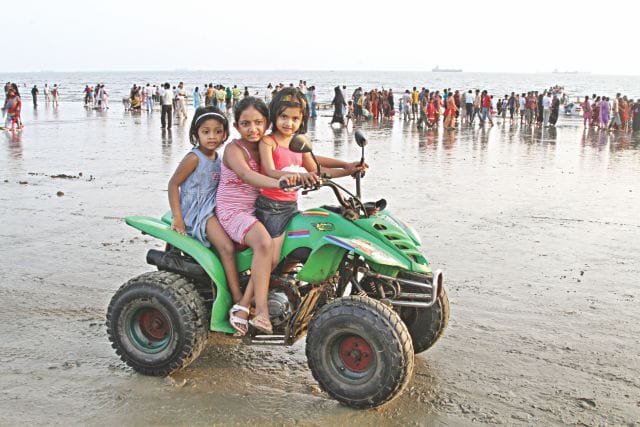Ecotourism can be a boom for the industry
 Children ride an all-terrain vehicle at the world's largest uncut beach at Cox's Bazar in the port city. Photo:Star
Children ride an all-terrain vehicle at the world's largest uncut beach at Cox's Bazar in the port city. Photo:Star
While the impact of global warming and climate change has been crucial in the question of sustainable tourism development, ecotourism has drawn the attention of world leaders.
International Ecotourism Society defines ecotourism as -- responsible travel to natural areas that conserves the environment and improves the welfare of local people. The Australian Commission on National Ecotourism Strategy terms it -- nature-based tourism that involves education and interpretation of the natural environment and is managed to be ecologically sustainable.
The United Nations designated 2001 as the 'International Year of Ecotourism' to promote eco-friendly tourism across the globe against mass tourism that causes much damage to nature and the environment. Ecotourism appears to have much in common with the concept of 'alternative tourism' or 'appropriate tourism', which has been discussed within the tourism industry for over a decade. For instance, it provides its greatest benefits (especially if applied at local levels) through pursuit of a widespread but controlled 'small is beautiful' philosophy.
The United Nations World Travel Organisation estimates that in 2007 ecotourism captured 7 percent of total international tourism market. Ecotourism and wildlife-related tourism are big business. It is estimated, for instance, that in 1988 there were between 157 million and 236 million international eco-tourists worldwide.
Ecotourism strives to minimise the adverse effects of hotels, trails, and other infrastructure by using either recycled materials or plentifully available local building materials, renewable sources of energy, recycling and safe disposal of waste and garbage, and environmentally and culturally sensitive architectural design. Minimisation of impact also requires that the numbers and mode of behaviour of tourists be regulated to ensure limited damage to the ecosystem.
Ecotourism means education, for both tourists and residents of nearby communities. Well before departure, tour operators should supply travellers with reading material about the country, environment and local people, as well as a code of conduct for both the traveller and the industry itself. This information helps prepare the tourist as the Ecotourism Societies guidelines state it is “to learn about the places and peoples visited” and “to minimise the negative impacts while visiting sensitive environments and cultures”.
Bangladesh possesses a great potential for ecotourism development. The country entirely itself is an ecotourism destination. There are plenty of ecotourism attractions lying hither and thither of this land. The offshore islands, haors and wetlands, mangrove forests, rivers and culture can be our ecotourism products.
Ecotourism can also be based on traditional culture, archaeological sites and ethnicity. The single largest mangrove forest of the world, the Sundarbans, is a gold mine for ecotourism. Unesco has declared it as a World Heritage Site. Besides, other ecotourism products include tea plantations in greater Sylhet, hilly green areas of Hill Tract Districts, sandy beaches at Cox's Bazar, Inani and Kuakata, rivers, lakes, forest and wildlife, glorious tribal life and the simple lifestyle of the villagers.
Bangladesh may also focus on ecotourism development at St. Martin's Island, a small continental island in the Bay of Bengal that is nine kilometres wide. It is endowed with vast marine and land resources having great biodiversity significance. The island is a good example of co-occurrence of corals, algae, seaweeds, grasses and mangroves.
St. Martin's Island is the most appropriate place of Bangladesh for development and promotion of ecotourism. The geographical location and its natural characteristic are congenial for ecotourism activities. World-class corals, rare species of turtle and serene blue waters around the island attract tourists. But uncontrolled and unplanned tourism may cost the island's natural setting. To protect the island and its bio-diversity, the government can go for ecotourism development instead of mass tourism.
It would help in sustaining the rich biodiversity as well as benefit the local people. However, development and promotion of ecotourism at the island is not an easy task. Waste management is a grave concern of the island. A population boom in the island poses a great threat to the depletion of biodiversity there. On the other hand, unscrupulous anchorage of tourist vessels damages the coral of the island. Hence, protection of the island and development of ecotourism may not be successful without a comprehensive ecotourism development plan.
Bangladesh should emphasise ecotourism in its tourism planning process. Though the government has enacted laws to ensure a pollution-free environment, these needs to be enforced properly with short, mid and long-term projects.
The government has enacted Environment Policy 1992 and Bangladesh Environment Protection Law 1995. The National Tourism Policy framed in 2010 also emphasises ecotourism development as well as preservation and conservation of natural and cultural products.
Ecotourism can bring improved income and living standards for local people. Ecotourism can revitalise local culture, especially traditional crafts and customs. It can stimulate the rural economy by creating demand for agricultural products and through infrastructure development project, it can inject capital into rural area. So for vigorous ecotourism marketing for the benefit of all sharers, there should be interaction among the local community groups and leaders and the local authorities.
Until now in Bangladesh the ecotourism concept is not properly reflected in the current national tourism development programmes. The tourism development issue has been skipped in 'Bangladesh Climate Change Strategy and Action Plan prepared in 2009 as well as in 'National Adaptation Programme of Action' developed in 2005.
Many tourism experts believe Bangladesh should go for ecotourism development instead of its effort to accommodate a large number of tourists beyond its capacity. Our neighbouring country Bhutan develops tourism in a well-planned and well-controlled manner with the theme 'Low volume, High Values', that means reaping optimal benefits with lesser and a manageable number of tourists. If Bangladesh targets 4-5 lakh tourists by 2020, will the country be ready to manage such a number of tourists?
For development of ecotourism in Bangladesh, it needs well-trained, multilingual guides with skills in natural and cultural history, environmental interpretation, ethical principles and effective communication. The country also needs ecotourism projects to help educate members of the surrounding community, schoolchildren of the host community. We all need to work hard for ecotourism development.
Bangladesh Parjatan Corporation may carry out different promotional activities for ecotourism. Special brochures and other promotional material may be published and distributed abroad through all foreign missions of Bangladesh. Participation in international tourism fairs, publication of features and advertisements in trade journals would also enable the country to promote its ecotourism products.
The writer works for Bangladesh Parjatan Corporation.

 For all latest news, follow The Daily Star's Google News channel.
For all latest news, follow The Daily Star's Google News channel. 



Comments